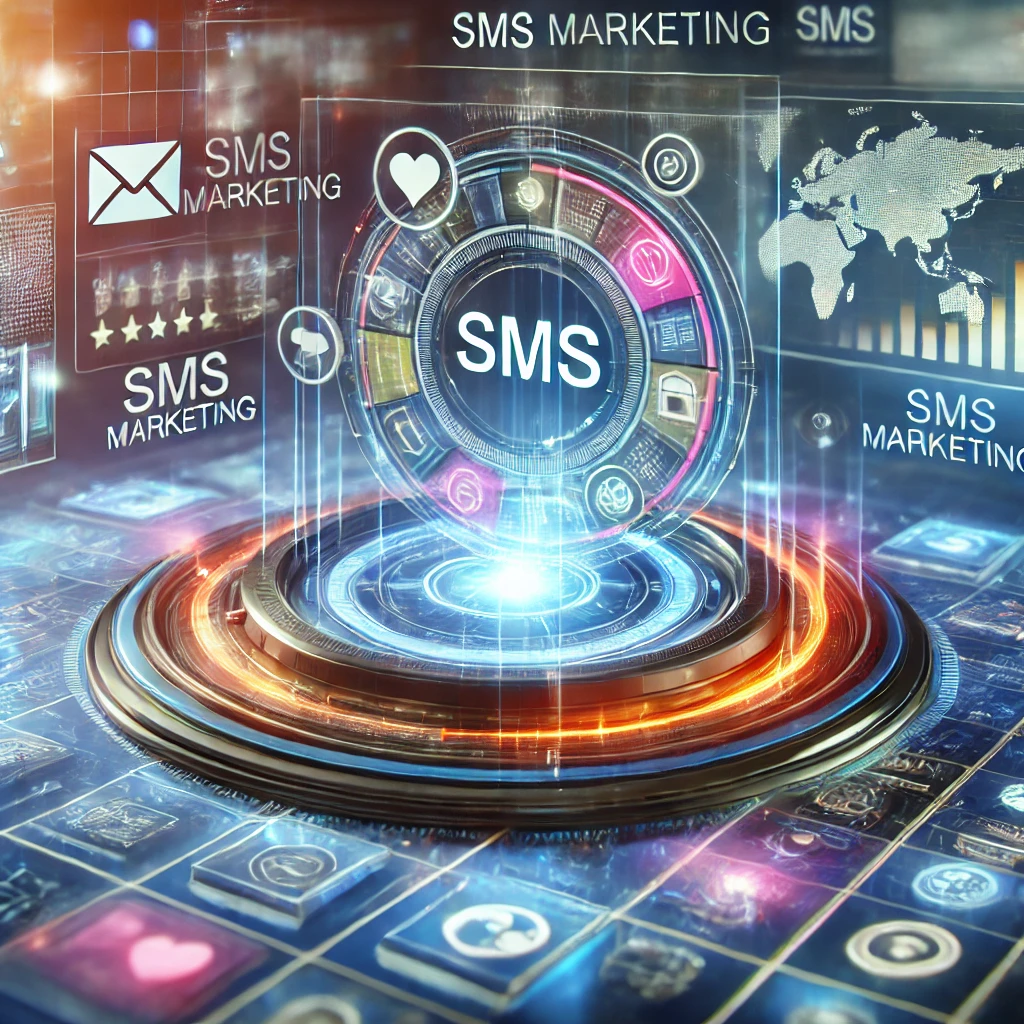Boosting SMS Marketing Conversion Rates in 2024: Key Statistics and Strategies
SMS marketing has become an essential tool for businesses looking to engage with their customers effectively. It involves sending promotional messages via SMS to a targeted audience. In today's digital age, where almost everyone owns a mobile phone, SMS marketing presents a direct and efficient way to reach customers. With the average person checking their phone multiple times a day, SMS marketing has a high open rate and can be a great way to grab your customers' attention. It allows for personalized communication, making it more likely for customers to engage with the messages they receive. Additionally, SMS marketing is cost-effective and allows for quick and easy campaign management.
Businesses can use SMS marketing to send out promotions, reminders, coupons, and even updates on their products or services. By providing valuable information to customers in a timely manner, businesses can build better relationships with their audience and ultimately drive more sales. However, it is important for businesses to ensure that they have permission to send SMS messages to their customers, as spamming can have a negative impact on their brand reputation. By following best practices and being transparent with their messaging, businesses can leverage the power of SMS marketing to connect with their customers and drive results.
SMS Marketing: Understanding the Basics
What is SMS marketing and why is it important for businesses?
SMS marketing is a strategy that involves sending marketing messages to customers via text messages. It is important for businesses because it offers a direct line of communication with customers, allowing for personalized interactions and quick delivery of promotional offers. SMS marketing is also an effective way to reach customers who may not have access to email or social media platforms, making it a valuable tool for businesses looking to expand their reach. It allows businesses to send targeted messages to specific groups of customers based on their purchasing behavior or demographics, increasing the likelihood of conversion and repeat business.
Furthermore, SMS marketing campaigns are highly cost-effective compared to traditional marketing strategies, making it an attractive option for businesses of all sizes. With high open rates and quick response times, SMS marketing has the potential to boost sales and drive customer loyalty.
In order to run successful SMS marketing campaigns, businesses must ensure that their messages are relevant, timely, and valuable to customers. Messages should be concise and to the point, with clear calls to action that encourage customers to take immediate action. By using SMS marketing effectively, businesses can build stronger relationships with customers and drive growth in sales and engagement.
How does SMS marketing differ from email marketing?
SMS marketing differs from email marketing in terms of immediacy and engagement. SMS messages are more likely to be opened and read quickly compared to emails, making SMS a more effective channel for time-sensitive promotions. Additionally, SMS messages have a higher open rate as they are received directly on the recipient's phone, whereas emails often get lost in crowded inboxes. This means that SMS marketing can reach a larger portion of your target audience in a shorter amount of time.
SMS messages also have higher engagement rates, with studies showing that SMS marketing campaigns often have click-through rates several times higher than email marketing campaigns. This is because SMS messages are short, direct, and to the point, making it easier for recipients to quickly respond to a call to action.
Overall, SMS marketing is a powerful tool for businesses looking to connect with their customers in a timely and engaging manner. By leveraging the immediacy and high engagement rates of SMS messages, businesses can increase brand awareness, drive sales, and build strong relationships with their customers.
What are the key elements of a successful SMS campaign?
The key elements of a successful SMS campaign include having a clear call-to-action, providing valuable offers, segmenting your audience for targeted messages, and ensuring compliance with regulations such as obtaining opt-in consent from recipients. It is also important to personalize your messages to make them more engaging and relevant to your audience. This can include using their name, referencing past interactions, or tailoring the content based on their preferences.
Additionally, monitoring and analyzing the performance of your SMS campaign is crucial to understand what is working and what needs improvement. By tracking metrics such as open rates, click-through rates, and conversion rates, you can optimize your campaign for better results.
Finally, maintaining a consistent schedule for sending messages and staying in touch with your audience regularly can help build customer loyalty and increase engagement over time. By following these key elements, you can create a successful SMS campaign that drives results for your business.
Calculating Conversion Rates in SMS Marketing
How to calculate the conversion rate of an SMS campaign?
The conversion rate of an SMS campaign is calculated by dividing the number of recipients who took the desired action (such as making a purchase or clicking on a link) by the total number of messages delivered, then multiplying by 100 to get the percentage. For example, if 500 messages were sent out and 50 recipients made a purchase as a result of the SMS campaign, the conversion rate would be calculated as (50/500) * 100 = 10%. This means that for every 100 messages delivered, 10 recipients took the desired action.
By tracking the conversion rate of an SMS campaign, marketers can gauge the effectiveness of their messaging and make adjustments to optimize future campaigns. A high conversion rate indicates that the message resonated with recipients and prompted them to take action, while a low conversion rate may signal that changes need to be made to the content, timing, or targeting of the campaign. Monitoring conversion rates can help businesses improve their return on investment and maximize the impact of their SMS marketing efforts.
“The future of business is social, and the future of social is SMS.”
What are the benchmarks for SMS marketing conversion rates?
The benchmarks for SMS marketing conversion rates vary by industry, but generally, a conversion rate of 10% or higher is considered to be excellent. However, it's essential to track and compare your conversion rates over time to gauge performance accurately.
How can businesses improve their SMS marketing conversion rates?
Businesses can improve their SMS marketing conversion rates by crafting compelling messages, offering exclusive promotions to recipients, segmenting their audience for targeted campaigns, and analyzing data to make data-driven decisions for optimization. Crafting compelling messages is crucial to capturing recipients' attention and prompting them to take action. A well-thought-out message should be concise, relevant, and personalized to the recipient's interests and needs. By offering exclusive promotions, businesses can create a sense of urgency and exclusivity, encouraging recipients to act quickly to take advantage of the offer.
Segmenting the audience allows businesses to tailor their messages to specific groups of recipients based on factors such as demographics, past purchase history, or engagement with previous campaigns. This targeted approach can significantly increase the likelihood of recipients responding positively to the message and ultimately converting.
Analyzing data is essential for businesses to understand what is working well and what needs improvement in their SMS marketing campaigns. By tracking key metrics such as open rates, click-through rates, and conversion rates, businesses can identify patterns and trends that can inform future campaign decisions. Data-driven decisions can help businesses optimize their SMS marketing efforts and maximize their conversion rates.
Overall, businesses that focus on crafting compelling messages, offering exclusive promotions, segmenting their audience, and analyzing data will be better equipped to improve their SMS marketing conversion rates and drive meaningful results for their business.
Key Statistics for SMS Marketing
What are some important SMS marketing statistics to consider in 2024?
In 2024, businesses should consider that SMS marketing boasts an average open rate of around 98%, making it a highly effective channel to reach customers. Additionally, SMS messages have a response rate that is 7.5 times higher than email marketing, showcasing the power of SMS for engagement. With the increasing use of mobile phones and the popularity of texting, businesses must also consider the convenience and immediacy of SMS marketing. Customers are more likely to read and respond to a text message quickly compared to an email, making it a great way to deliver time-sensitive offers or promotions.
Furthermore, SMS marketing allows for personalized communication with customers through segmentation and targeting based on their preferences and behavior. This can lead to higher conversion rates and increased customer loyalty.
In the fast-paced world of marketing, staying ahead of the competition is crucial. By incorporating SMS marketing into their strategies, businesses can effectively engage with customers, drive sales, and ultimately, increase their revenue in 2024 and beyond.
How do SMS conversion rates compare to other marketing channels?
SMS conversion rates typically outperform other marketing channels like email marketing and social media advertising due to the direct and personal nature of SMS messages. This makes SMS a valuable tool for driving conversions and generating immediate responses from customers. SMS messages are delivered straight to a customer's mobile device, making it easier for them to see and act on the message right away. Plus, since most people have their phones with them at all times, SMS messages have a high open rate compared to emails or social media posts.
Additionally, SMS messages can be personalized to cater to individual customer preferences and behaviors, increasing the likelihood of a successful conversion. By leveraging SMS marketing, businesses can effectively reach their target audience with timely and relevant messaging, ultimately driving sales and increasing customer engagement.
What is the average conversion rate for SMS marketing campaigns?
The average conversion rate for SMS marketing campaigns ranges between 8-10%, indicating the effectiveness of SMS in driving desired actions from recipients. Businesses that optimize their SMS campaigns with best practices can achieve even higher conversion rates.
Best Practices for Effective SMS Marketing
What are some best practices to optimize SMS messages for higher conversion rates?
To optimize SMS messages for higher conversion rates, businesses should keep messages concise and clear, include compelling calls-to-action, personalize messages based on recipient preferences, and test different tactics to see what resonates best with their audience.
Additionally, businesses should also segment their audience to send more targeted messages, schedule messages at optimal times to increase engagement, and use emojis and multimedia content to make messages more visually appealing. It is important to track and analyze the performance of SMS campaigns to continually improve and refine messaging strategies. By following these practices, businesses can effectively leverage SMS as a powerful tool for driving conversions and building customer relationships.
How can businesses use SMS marketing for time-sensitive promotions?
Businesses can leverage SMS marketing for time-sensitive promotions by sending out limited-time offers, flash sales, or exclusive deals via text messages. The immediacy of SMS ensures that recipients are more likely to act quickly, leading to higher conversion rates for time-sensitive campaigns.
Why is it crucial for marketers to focus on building opt-in SMS lists?
Building opt-in SMS lists is crucial for marketers to ensure that they are sending messages to recipients who have explicitly agreed to receive communications. This not only improves engagement rates but also helps businesses stay compliant with regulations and avoid spamming recipients.
Utilizing SMS Marketing Alongside Other Channels
How can businesses integrate SMS marketing with their overall marketing strategy?
Businesses can integrate SMS marketing with other channels by creating a cohesive omnichannel marketing strategy that includes SMS, email, social media, and more. By coordinating messaging across channels, businesses can enhance brand visibility and engage with customers at various touchpoints. This integrated approach allows businesses to reach their target audience in a more personalized and effective way, ultimately increasing customer loyalty and driving revenue. For example, a business can use SMS to send out exclusive deals or promotions, while simultaneously promoting those same offers on social media and following up with an email highlighting the benefits of the promotion. This creates a seamless and cohesive experience for the customer, making them more likely to engage with the brand and make a purchase.
Furthermore, by analyzing the data and insights gathered from each channel, businesses can gain a better understanding of their customers' preferences and behaviors, allowing them to tailor their marketing efforts accordingly. This level of personalization not only strengthens the relationship between the business and the customer but also improves the overall customer experience.
In today's fast-paced and digital world, it's essential for businesses to adapt and evolve their marketing strategies to stay competitive. By integrating SMS marketing with other channels, businesses can create a more holistic and impactful marketing approach that resonates with their target audience and ultimately drives success.
What role does SMS marketing play in multi-channel campaigns?
SMS marketing plays a pivotal role in multi-channel campaigns by providing a direct and immediate way to communicate with customers. When integrated with other channels, SMS can amplify campaign reach and effectiveness, driving conversions and strengthening customer relationships.
Why is it important to track metrics such as open rates and click-through rates for SMS?
Tracking metrics like open rates and click-through rates for SMS campaigns is essential for measuring campaign performance and identifying areas for improvement. By analyzing these metrics, businesses can refine their messaging, target the right audience segments, and optimize their overall SMS marketing strategy effectively.


Conclusion
SMS marketing is an incredibly powerful tool for businesses to engage with their customers in a direct and personal way. By understanding the basics, calculating conversion rates, and following best practices, businesses can optimize their SMS campaigns for higher engagement and better results. With the impressive statistics backing up the effectiveness of SMS marketing, it's clear that this channel should be a key part of any comprehensive marketing strategy.
As we move into 2024, leveraging the power of SMS alongside other marketing channels will be crucial for businesses aiming to stay competitive and connect with their audience in meaningful ways. By integrating SMS marketing into their overall strategy, businesses can create a cohesive and impactful approach that drives sales, boosts customer loyalty, and ultimately, enhances their brand presence.



.jpg)


